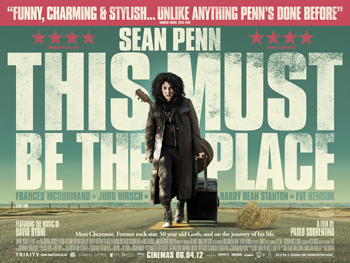This Must Be The Place ***
 Writer-director Paolo Sorrentino’s new film This Must Be The Place is a far cry from the tense political drama Il divo (2008) – in fact it’s the complete reverse; a soothing journey with a dark purpose that awakens its curious lead from his hypnotic slumber. It’s a strangely alluring piece of filmmaking as its not clear how things will pan out, and actor Sean Penn plays one of the most sedate characters to date but who has a capacity to rupture into something altogether different.
Writer-director Paolo Sorrentino’s new film This Must Be The Place is a far cry from the tense political drama Il divo (2008) – in fact it’s the complete reverse; a soothing journey with a dark purpose that awakens its curious lead from his hypnotic slumber. It’s a strangely alluring piece of filmmaking as its not clear how things will pan out, and actor Sean Penn plays one of the most sedate characters to date but who has a capacity to rupture into something altogether different.
Bored, retired rock star called Cheyenne (Penn), who is married to Irish fight fighter Jane (Frances McDormand) and lives a quiet life in Dublin, receives a phone call that his Jewish father is ill. He sets out to find his father’s executioner, an ex-Nazi war criminal who is a refugee in the US, and so starts a self-reflective journey.
Apart from Penn’s fascinating transformation into a haunting cross between The Cure’s Robert Smith and Edward Scissorhands, it’s the film’s striking cinematography by Luca Bigazzi that captures the dramatic mood, palette and landscape scenes, including the crystal blue of Penn’s eyes, implying a soul still very much alive in the rocker’s shell.
Cheyenne is the kind of character you will either be instantly drawn to or not – there is no middle ground. Thankfully, it was the former – or the rest of the film doesn’t work and will feel like a drag. Penn’s sensitive, childlike portrayal is both crushingly touching and tragic; you want to first dismiss Cheyenne’s disinterest as petulant teen behaviour and conveniently pigeon hole him as the spoilt ex star, bored by his trappings of fame. However, it becomes very clear through his whimpering limited responses that he has not given up on life, but that he is mature enough to carefully choose his words, as he’s fully aware of their impact – and he is trying to find purpose in his solitude.
There is a delightful contradictory character to compliment Cheyenne’s despondent mood, his rock, Jane, played by McDormand. Sorrentino said he only saw the actress in the role, and it’s clear that this small but crucially significant maternal part was made for McDormand. Through her responses we are given a sense that there is more to invest in Cheyenne and his curious behaviour, so we are drawn in to discover more. It’s actually her presence that injects a playful quirkiness into the whole affair, and the idea that a rock star falls for a fire fighter is also an analogy for Jane being Cheyenne’s protector from the outside world. In fact, Cheyenne’s closeted, immature existence is highlighted by his trips to the local shopping centre to hang out with young Goth fan, Mary (Eve Hewson), and discuss teen issues like her love life over a café drink.
The phone call then exposes Cheyenne to the outside world, and like a man coming of age again, he leaves his solitude and experiences real life and its bumpy road, but always at his own beguiling pace of action. It’s this pace that you need to commit to, to fully appreciate the visuals and atmosphere at work – bizarrely, annoyingly punctuated by the wheels on Cheyenne’s suitcase. It is here that the film feels a little lost when it has its most plot-worthy purpose, mimicking elements of other road movies, motel scenes and poignant music scores, and feels like an excuse to do so by Sorrentino to make his very own homage to the genre with an eccentric, out-of-place lead.
The final confrontational scene is sensitively realised and poetically handled – especially as the use of the Holocaust to incite emotion in such a melancholy character could have been mistreated. It still feels like a curious, if uneasy premise for a road movie though, but Sorrentino’s flawed and seemingly innocent characters’ self-reflective take goes to render this more palatable. Penn’s performance may be understated in this, unlike his previous outspoken roles, but as Cheyenne he is just as stirring and memorable.
3/5 stars
By @FilmGazer